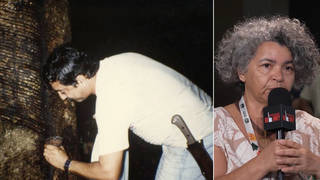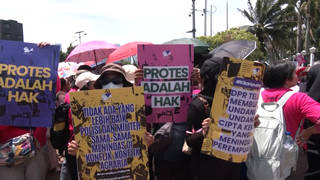
Topics
We now go to a story that is happening all to often in these times of increased corporate media control. A journalist is ousted from his or her job for reporting on a story that conflicts with the interests of the head of their news organization. When the reporter cries censorship, the news organization tries to justify the ouster by discrediting the reporter, and by refusing to acknowledge publicly that the reporter had ever been fired.
This is what happened to Terry Allen, a reporter for Vermont’s Times Argus Rutland Herald, when she published a story revealing that among the graduates of Norwich University, a private military academy in Northfield, were members of the Indonesian military’s notorious Special Forces, known as the “kopassus.” The kopassus has been accused of committing crimes against humanity in East Timor, as well as human rights abuses in Indonesia.
The story had an enormous impact–it was picked up by most major networks, brought political heat to Norwich and prompted some members of Congress to protest to the Clinton administration.
Allen’s newspaper, the Times Argus Rutland Herald, would not publish the story, but she finally got it published as a front-page story in the Boston Globe. Less than two weeks later, the Times Argus Rutland Herald fired Allen.
Central to this story is the relationship of the Times Argus Rutland Herald’s publisher, John Mitchell, to Norwich University. He is a member of the school’s board of fellows and a donor to the school, although he has not disclosed a dollar figure.
Guests:
- Terry Allen, freelance reporter.
- Tom Greene, spokesperson for Norwich University. Speaking from Northfield, Vermont.











Media Options